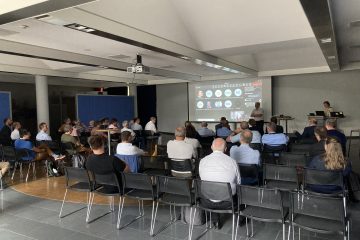Report on the Young Generation's 2024 Young Talent Conference
As a private individual who is in favour of expanding the peaceful use of nuclear energy, it is rare to have the opportunity to visit a nuclear power plant. But if my experiences in the automotive industry and healthcare have taught me one thing about problem solving, it's that you have to go where the action is to understand the situation. So when I found out that the Joint Young Generation Conference 2024 (9-11 October) would be held at the Zwentendorf nuclear power plant, I registered as a representative of the KTG's Young Generation.
The Zwentendorf nuclear power plant was also never in operation, due to the result of the Austrian referendum in 1978, in which a narrow majority voted against the use of nuclear energy to generate electricity (50.5 % voted against out of a 64.1 % turnout). When you visit an operating power plant, you are only allowed to enter certain buildings or floors, and certainly not rooms that are normally exposed to extreme environmental conditions. In Zwentendorf, however, we even stood inside the "containment" that surrounds the reactor and marvelled at this marvel of technology.

I took away two important insights: Start small, but get started. We should apply this to the construction of power plants and the creation of impetus for social change.
The scale of microreactors (in the order of 10 MWe per reactor) was a hot topic in several presentations and networking discussions. Prof. Dr Jörg Starflinger from the University of Stuttgart gave an overview of the various approaches to micromodular reactor (MMR) technology. Dr Aliki van Heek from Bèta Research presented the technologies of small modular reactors (SMR) and Generation IV. Michael Crabb (Last Energy) and Dr Mario Müller (Emerald Horizon) each presented the perspective of their microreactor-based startups. A key concept is that the smaller scale enables a private class of investors (not just governments) to fund nuclear energy projects. The vision of 10,000 smaller, factory-produced generators instead of the traditional handful of mega-projects (each with mixed success) raises many questions. But one thing is clear: there are people out there working together to find those answers - safely, profitably and quickly.

For all the scientific expertise we have and need, it's still about people working together to do their best under different constraints and often with competing goals. At the Young Professionals Conference, I met professionals who started out as nuclear engineers and are now either continuing on that path with more understanding of all the other "pieces of the puzzle" or working directly in other corporate roles. Without having a technical background myself, I left the conference feeling encouraged to make a contribution that recognises that some of the biggest challenges in the nuclear industry are fundamentally not technical issues. We can start with consumer needs for clean, cheap and reliable electricity (or process heat, radioisotopes or more). We should inform and co-operate with the public, public institutions and beyond. As a young professional (or young at heart), you should pick a starting point, set a goal, get going and get others involved.
Just a few days before the event, on 6 October, Kazakhstan decided to build a nuclear power plant in a referendum (73.1 % voted in favour), with a voter turnout of 63.7 %, which is strikingly similar to the voter turnout in Austria in 1978. This gives me hope for the DACH region that nuclear energy will regain momentum despite historical adversity.
I am grateful to all 40+ participants, co-organisers and tour guides. I would like to thank Nuclear Engineering Seibersdorf (NES) for an up-close and informative tour of the reprocessing and storage facilities and the Austrian Nuclear Society (ÖKTG) for a fascinating and thorough tour of the power plant. I also hope that the district of Tulln and its neighbours recover quickly from the recent flooding.

The complete programme with the topics Innovation in Nuclear Technology, Innovation in Decommissioning/AM and Innovation in Human Resources Management/Finance can be found at https://www.gemeinsame-nwt.org/programm.
Fabian Poliak - Member of the Young Generation of KTG e.V.


